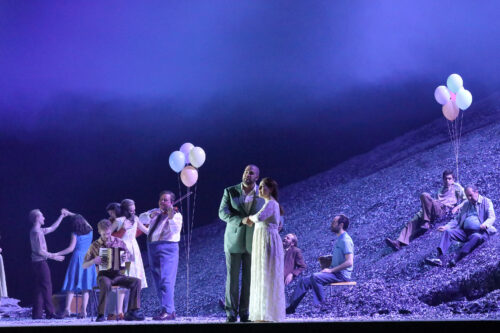 Germany Verdi, Aida: Soloists, Chorus and Orchestra of Bayerische Staatsoper / Daniele Rustioni (conductor). Nationaltheater, Munich, 15.5.2023. (ALL)
Germany Verdi, Aida: Soloists, Chorus and Orchestra of Bayerische Staatsoper / Daniele Rustioni (conductor). Nationaltheater, Munich, 15.5.2023. (ALL)

Production:
Director – Damiano Michieletto
Set design – Paolo Fantin
Costume design – Carla Teti
Lighting – Alessandro Carletti
Choreography – Thomas Wilhelm
Video – rocafilm
Dramaturgy – Katharina Ortmann, Mattia Palma
Choruses – Johannes Knecht
Cast:
Aida – Elena Stikhina
Radamès – Brian Jagde
Amneris – Anita Rachvelishvili
Ramfis – Alexander Köpeczi
Amonasro – George Petean
The King – Alexandros Stavrakakis
A Messenger – Granit Musliu
A Priestess – Elmira Karakhanova
Priests – Andrés Agudelo, Elmira Karakhanova
We live in a world at war. This new production of Aida was likely scheduled before Russia’s invasion of Ukraine, but how can one not think of the current situation when experiencing this opera that speaks of victorious soldiers, as much as it does of those defeated, as well as of love and passion.
The choices made by director Damiano Michieletto in this Aida were quite ‘clever’. Paolo Fantin’s set represents a sort of school converted into a refugee camp, something we are now quite familiar with from other stagings. Carla Teti’s costumes are modern and it is impossible to tell who the winners are and who are the losers. Several ballet scenes are performed by children. The triumphal march is transformed into an anti-militaristic video. The set for the second part is a large pyramid of ash, a theme that is referred to several times. The closing scene presents the two protagonists accompanied by a somewhat dreamlike parade à la Fellini, including a young Aida and her father…

All of this is not without intelligence, even though this is a case in which the production is less interesting than the Konzept, especially because one cannot help but think that the text and the story of this opera are not on the same level as the striking War and Peace (review click here) recently presented on this very same stage. More than once this comparison reminded me that we had moved from Tolstoy to rather one-dimensional characters.
But the musical calibre was very high. In the title role, Elena Stikhina, who sang the part in Salzburg last year, once again demonstrated her great talent. Her timbre is clear, with beautiful dynamics, superb phrasing, and real emotion emanating from her singing. Beside her, Brian Jagde was a radiant Radamès, high notes truly powerful. He would benefit from using his resources to work a little more on his phrasing and certain softer nuances, but this was a tenor performance with the Italianate style required for the role.
Anita Rachvelishvili (Amneris) had the volume and resonant low notes we know her for, even if she struggled slightly in her higher register during the first part. Alexander Köpeczi (Ramfis) had a superb depth of timbre. Both George Petean as Amonasro and Alexandros Stavrakakis in the role of the King sang flawlessly, but were a little more bland in their acting.
The great triumph of this Aida was in the pit. Daniele Rustioni showed us how subtle Verdi’s music is. The tempos were lively but never rushed, allowing the phrasing to develop and underline the architecture of Verdi’s musical line. Orchestra and chorus had colour, strength, and dynamics. Every premiere usually suffers from a few musical inaccuracies that disappear as the performances progress, but this was not the case here, as the quality was extremely high throughout.
Antoine Lévy-Leboyer

In the last performance, on April 28, Jonas Kaufmann was singing Radames. The flat description above of the set gives no idea of what it was like to see and hear the final act live. It was sublime. That triangular pyramid of ash gleamed; the figures entering from the left resembled scenes recalled from paintings by Marc Chagall and takes from Fellini’s 8 1/2. Kaufmann perfectly interprets this music. And there is his voice.